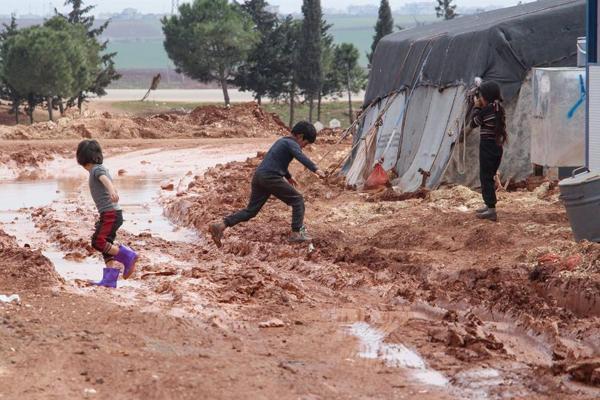Leaders to hold Idlib summit on March 5
ANKARA


Syrian children play in the mud at a camp for displaced people from the east of Maaret al-Numan, near the cemetary of Kafr Yahmul village north of Idlib in northwestern Syria, on Feb. 23, 2020. (AFP Photo)
Turkey’s president has said that he will meet with the leaders of Russia, Germany and France on March 5 to discuss the recent situation in Syria and Libya.
“Sometimes, the interests of our country and other powers conflict in this struggle. […] Turkey has enough power and capacity to pursue an independent policy and implement this on the ground,” Recep Tayyip Erdoğan said during his visit to the western Turkish province of İzmir where he attended several opening ceremonies and held speeches.
Referring to Turkey’s strategy in the region, he said that after phone calls with Putin, Macron, and Merkel on Feb. 21, a roadmap was drawn.
In a phone conversation, Erdoğan told Putin that the Assad regime must show restraint and the humanitarian crisis must end in Idlib.
He added that resolving the crisis unfolding in Idlib hinges on full implementation of the 2018 Sochi deal.
Both leaders reiterated their commitment to all agreements reached concerning Syria.
In the phone call with Macron and Merkel, Erdoğan also said the aggression by the Syrian regime and its supporters in Idlib should come
to an end.
Referring to phone calls with Putin, Merkel and Macron, Erdoğan said: “The Idlib issue is as important as Afrin and the Peace Spring region. We will meet again on March 5 to discuss the same issues.”
He underlined that Turkey’s operations brought peace to the areas that were held by the YPG for a while, and Turkey aims to establish the same peaceful environment in Idlib.
Turkey deems YPG as the Syrian offshoot of the outlawed PKK, which is listed as a terrorist organization by Turkey, the United States and the European Union.
No ‘adventure, arbitrariness’
Erdoğan also stressed that Turkey’s policies on Syria and Libya are “neither an adventure nor an arbitrary choice.”
“If Turkey avoids struggling in Syria, Libya, the Mediterranean and generally in the region, those will return to the country with a heavier toll in the future,” he said.
Idlib, near Turkey’s southern border, falls within a de-escalation zone laid out in a deals between Turkey and Russia.
The Syrian regime and its allies, however, have consistently broken the terms of the cease-fire, launching frequent attacks inside the territory where acts of aggression are expressly prohibited.
The de-escalation zone is currently home to about 4 million civilians, including hundreds of thousands displaced in recent years by regime forces throughout the war-torn country.
Some 1 million Idlib refugees have moved towards the Turkish border in recent months, fleeing attacks by the Assad regime and its allies, and causing a desperate humanitarian situation.
Turkey has called for an immediate halt to the attacks on Idlib and for the cease-fire to be followed, warning that if the attacks do not stop, Turkey will take action.
